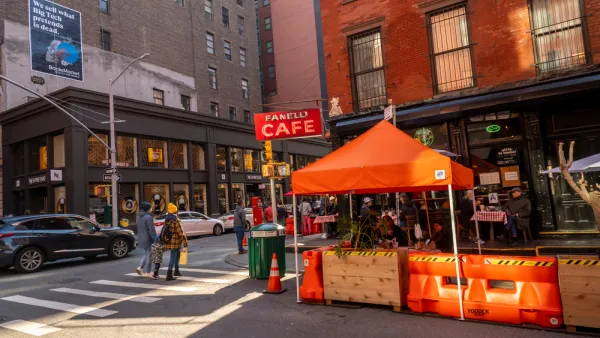New regulations and fees for outdoor dining patios, extended from a pandemic-era program, are making the process overly complicated and expensive for business owners.

In an opinion piece for the Toronto Star, Edward Keenan criticizes the Toronto for “ruining” the CaféTO outdoor dining program in the process of trying to make it permanent.
After the city reduced the onerous fees and rules imposed by a first draft of the program in January, applicants now say they are waiting months for approvals. For Keenan, this is unacceptable. “Let me make this as clear as I can: the patio season in Toronto is short, maybe 100 days a year. If the ‘detailed review’ process you’ve set up for patio approvals takes well into the warm weather patio season to conclude, then you’ve botched it.”
Here’s the core thing to understand: these patios make the city a better place — they are good for business, good for neighbourhoods, good for the liveliness of streets. We should be begging shopkeepers to install them. Instead we’ve made it difficult.
Keenan notes that this isn’t the only way the city finds “something we actively want or need people to do,” then makes residents “ jump through (often expensive) hoops to do it.” The same applies to building denser housing, Keenan writes.
For Keenan, this fails to internalize the lessons of the pandemic, which showed that “when our backs are against the wall, we can do things, through our government, together — and we can do them quickly.”
FULL STORY: We are slowly but surely killing the CaféTO patio program. Shame on us

National Parks Layoffs Will Cause Communities to Lose Billions
Thousands of essential park workers were laid off this week, just before the busy spring break season.

Retro-silient?: America’s First “Eco-burb,” The Woodlands Turns 50
A master-planned community north of Houston offers lessons on green infrastructure and resilient design, but falls short of its founder’s lofty affordability and walkability goals.

Delivering for America Plan Will Downgrade Mail Service in at Least 49.5 Percent of Zip Codes
Republican and Democrat lawmakers criticize the plan for its disproportionate negative impact on rural communities.

Test News Post 1
This is a summary

Test News Headline 46
Test for the image on the front page.

Balancing Bombs and Butterflies: How the National Guard Protects a Rare Species
The National Guard at Fort Indiantown Gap uses GIS technology and land management strategies to balance military training with conservation efforts, ensuring the survival of the rare eastern regal fritillary butterfly.
Urban Design for Planners 1: Software Tools
This six-course series explores essential urban design concepts using open source software and equips planners with the tools they need to participate fully in the urban design process.
Planning for Universal Design
Learn the tools for implementing Universal Design in planning regulations.
EMC Planning Group, Inc.
Planetizen
Planetizen
Mpact (formerly Rail~Volution)
Great Falls Development Authority, Inc.
HUDs Office of Policy Development and Research
NYU Wagner Graduate School of Public Service




























